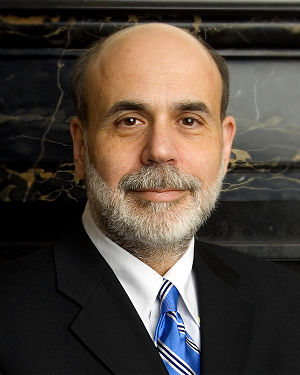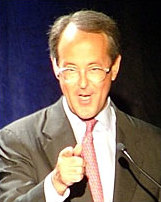 Image via WikipediaIt’s a good thing we have the Tea Party and citizens’ groups unafraid to take on our too-often ridiculous federal government over outrageous insults to our people. Look for more well-deserved protests over the Transportation Safety Administration’s nude body scans and “enhanced” pat-downs. I predict that these unreasonable procedures won’t hold up for long.
Image via WikipediaIt’s a good thing we have the Tea Party and citizens’ groups unafraid to take on our too-often ridiculous federal government over outrageous insults to our people. Look for more well-deserved protests over the Transportation Safety Administration’s nude body scans and “enhanced” pat-downs. I predict that these unreasonable procedures won’t hold up for long.Things like this make it harder to have proper respect for government, particularly some of the more contemptible and pathetic features of the Obama Administration. It’s not enough to spend our country into financial oblivion and take over major industries, now they have crossed yet another line that should never be crossed, for reasons which, like the “climate change” nonsense, bear little resemblance to reality.
Under the phony guise of “safety” they treat people (as Ron Paul described) “like cattle,” and some people are willing to meekly accept it. Rep. Paul (R-TX) has introduced legislation to fix the problem. You may have seen this video before, but it’s worth another look:
If the authorities are really interested in protecting anyone, they should adopt Israel’s policy of putting people into a booth that will detonate any explosives they’re carrying. That would solve the problem.
But instead, the Porn and Pervert Department (TSA) is going to feel up passengers, child or adult, in ways that would constitute a sex crime if done by anyone else. An exception would possibly be Muslim women in burquas, since they are members of a special favored group these days. Or else, passengers must be run through a nude body scanner that will give the bureaucratic pervs something to chuckle over. What total nonsense. Americans simply can’t, and, I believe, won’t put up with this patently offensive and unconstitutional procedure.
Meanwhile George Soros and former DHS Secretary Michael Chertoff stand to make a lot of money on the equipment used for this demeaning and sorry process. I predict they’ll be called to testify in a House investigation in 2011. Someone should be investigating the TSA and firing Janet Napolitano. She should demonstrate her approval of the TSA process by receiving a pat-down, joined by members of Congress, like Ron Paul suggested.
As for Chertoff, according to the Washington Examiner,
After the undie-bomber attempt on Christmas 2009, Chertoff went on a media tour promoting the use of these scanners, without disclosing that he was getting paid by Rapiscan, one of the two companies currently contracted by TSA to take a nude picture of you at the airport…
Chertoff was quickly reamed for not disclosing how he had monetized his public service.
The whole situation is depressing for two reasons:
1) It’s tawdry how much our “public servants” use their government jobs as meal tickets.2) It’s sad how much companies set up their businesses to depend on government, and thus lobbyists. [1]
George Soros?
As for the company’s other political connections, it also appears that none other than George Soros, the billionaire funder of the country’s liberal political infrastructure, owns 11,300 shares of OSI Systems Inc., the company that owns Rapiscan. Not surprisingly, OSI’s stock has appreciated considerably over the course of the year. Soros certainly is a savvy investor. [2]
Maybe not illegal, but bad form anyway. Whatever the means that led to the acquisition of these devices, the real offense is in their use.
Fortunately (I suppose), not every passenger is being subjected to this insufferable (I’m running out of adjectives here) treatment, which makes it look even more stupid. So Big Brother has yet another way to intrude into our private (and I mean private) lives. If this is allowed to continue, I hate to contemplate what the next step might be. Between this and Obamacare, your government appears to think that your body belongs to them.
The concerns over this outrageous procedure include possibly harmful radiation from the scans. TechNewsDaily reports that a lawsuit has been filed by the Electronic Privacy Information Center in Washington, D.C., seeking suspension of the scanning process until health concerns are addressed:
Radiation acts as a multiplier of natural cancer rates, Brenner said. There are 800,000 cases of basal cell carcinoma diagnosed in the United States each year, which is one of the most common cancers associated with X-ray exposure…
“There is no good reason why [TSA] scans the head and neck, especially since you can’t hide explosives there,” [David] Brenner [of Columbia University] said. [3]
Back to privacy concerns, the article reports,
The EPIC lawsuit states that the program run by the DHS violates the Privacy Act and the Administrative Procedure Act. It also alleges that the systems violate the Religious Freedom Restoration Act, referencing religious laws about modesty.
“It violates modesty for many religions,” McCall said. “We’ve seen Catholics, Orthodox Jews and Muslims all upset by the invasive scanning technologies. It’s a violation of their religious freedom.” [4]
Not simply stating the problem, the article discusses a better alternative that doesn’t have the most objectionable features of the Rapiscan process. [5]
TSA procedures have been duly objected to by George Will and Charles Krauthammer, brilliant and eloquent columnists I greatly respect. You’ve probably read several things about this, but I thought I needed to toss in my two cents.
Full disclosure: I haven’t flown in several years, and I probably won’t again. But these government attacks on human dignity and liberty threaten everyone and make me angry. I admire John Tyner for voicing his famous objection. He is facing a possible large fine for his trouble.
[1] Timothy P. Carney, “Bush’s Homeland Security Secretary flacking for nudie-scanners, too,” 11/14/10, The Washington Examiner.
[2] Mark Hemingway, “George Soros also profiting off controversial new TSA scanners,”
11/14/2010, The Washington Examiner.
[3] Samantha Murphy, “Lawsuit Filed Over Airport Scanner Privacy, Health Concerns,” 08/06/2010, TechNewsDaily.
[4] and [5] Ibid.








